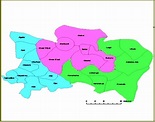Following the backlash and criticisms trailing the proposed 5 percent tax on petroleum products, the Federal Government has said implementation of the new surcharge would not take effect until 2026.
Besides condemnations from several quarters given the already high cost of living and hardship in the country, the Trade Union Congress of Nigeria (TUC) had on Monday issued a 14 day ultimatum to the federal government to rescind it’s decision or risk a total shut down of the economy.
Minister of Finance and Coordinating Minister of the Economy, Mr. Wale Edun who briefed newsmen on Tuesday in Abuja, explained that even though the Tax Act would become operational on 1st January 2026, implementation of the 5 percent surcharge may still.ne delayed after that date.
Edun noted that the surcharge which targets petrol, diesel, and other fossil fuels, required a formal government proclamation and an official order signed by the finance minister to be published in the National Gazette before it’s implementation.
He said: “The tax reform bills and the Tax Act will not become operational until January 1, 2026, and the 5% fuel surcharge, which is mentioned therein, will not automatically come into effect.
“There’s even a process before any such charge can come into effect. It requires a commencement order from the Honorable Minister of Finance and this, indeed, must be published in a gazette. So it’s not automatic that we wake up on January 1 and there’s a new tax and it’s going to be levied.
“No, there’s a whole formal process involved and as of today, no order has been issued, none is being prepared, and there is no plan, no immediate plan to implement any surcharge. Let’s look at the transition from the legal framework to implementation.”
While emphasising that the surcharge was not a new tax, the minister who noted it was first introduced in 2007 under the Federal Road Maintenance Agency (FERMA) Act, described its inclusion in the new act as a move for “harmonisation and transparency.”
“It was designed as a user charge to sustainably finance Nigeria’s road network and its maintenance and its upkeep. The original purpose was that 40% of the proceeds of that user charge would go to FERMA, while 60% would go to the states, or the state equivalent of FERMA, the State Road Management Agencies by whatever name or form.
“Also, the policy objective was to ensure safer, better-maintained roads, and we know how critical that is, not just for safety of lives and property, for mobility, but of course for economic growth, as it is through the road network largely, that goods are delivered.
On why the surcharged appeared in the new Act he said, “the Nigeria Tax Administration Act 2026 as it would be or 2025 when it was passed, did not create a new surcharge. It simply restated and harmonized the existing provisions into a single transparent framework for clarity and ease of compliance and I think it’s important to make this distinction.
“The inclusion of the surcharge in the 2025 Nigeria Tax Administration Act does not mean an automatic introduction of new tax. It doesn’t mean fresh taxation automatically.
“The government is fully aware of the economic pressures of the time and will not take decisions that will make things even more burdensome. We don’t worsen the burden on Nigerians.
“Our priority is to strengthen tax governance, block revenue leakages, improve efficiency, rather than just levy new taxes, charges, and costs. Our economic journey in 2025 is marked by renewed microeconomic stability. There is growing investor confidence.
“There is an affirmation that we are in the right direction from development partners, partners, international observers, international rating agencies, amongst others. And there is a continued momentum for structural reform that is taking this economy from the current levels of growth to higher and more inclusive levels of growth.
“So it is our collective responsibility to translate the policies that are in place into better jobs, higher incomes, and improve public services and we need to ensure that the reforms that have been carefully defined and are evidence-based are responsibly implemented.









